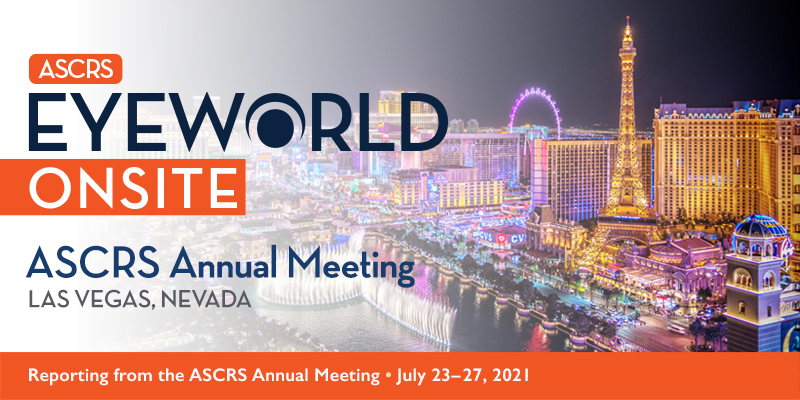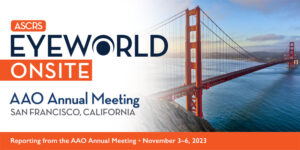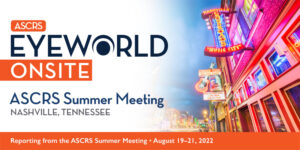
Both the ASCRS Annual Meeting and the ASOA Annual Meeting began on Saturday, with opening sessions and a variety of symposia, courses, labs, and other sessions.
ASCRS Annual Meeting officially kicks off with Opening General Session
The 2021 ASCRS Annual Meeting kicked off on Saturday morning with the Opening General Session. Edward Holland, MD, chair of the ASCRS Program Committee, began by addressing attendees. “We are so delighted to be back in the most effective learning environment together in person,” he said.
The session continued with Dr. Holland interviewing Richard Hoffman, MD, current ASCRS president, and Terry Kim, MD, immediate past president. Dr. Kim and Dr. Hoffman were both given their presidential medals.
Dr. Kim discussed his experience as ASCRS president and the many challenges brought on by the COVID-19 pandemic. He initially set a goal to expand both domestic and international membership, which was difficult when colleagues and members could not be together. “I wanted to reach out to every refractive and cataract surgeon in our country to let them know the benefits of being an ASCRS member,” he said.
Dr. Kim said he thinks ASCRS is “the best organization out there in terms of education and resources we provide for surgeons here and around the world.”
Dr. Hoffman described how he came to practice ophthalmology with Howard Fine, MD, and how he became involved with ASCRS, noting how rewarding it has been.
He also discussed the goals for his presidency, including continuing to fight Medicare cuts and prior authorization issues, recovering from the COVID-19 pandemic, and updating the ASCRS bylaws.
Thomas Oetting, MD, was recognized as the winner of the first ASCRS Educator Award. This award acknowledges an ASCRS member who has made education an enduring career priority.
ASCRS Executive Director Steve Speares took to the stage, mentioning ASCRS’ mission focusing on educating, advocating, and donating. He highlighted the advocacy aspect, recognizing Nancey McCann, who recently retired as ASCRS director of Government Relations after 28 years with the society. She has been a truly special asset for ASCRS and ASOA members, he said, fighting for the interests of anterior segment surgeons, their practices, and their patients. “She was our go-to to understand policy changes and the impact on members,” Mr. Speares said. Rather than focusing on political party, Mr. Speares said Ms. McCann’s main focus was always ophthalmology, and “ophthalmology was better for it.”
The session continued with David Chang, MD, and the presentation of the Chang-Crandall Humanitarian Award. The award was recently renamed in honor of the late Alan Crandall, MD.
This year’s winners were Geoff Tabin, MD, and Sanduk Ruit, MD.
This year’s ASCRS David A. Karcher Honored Guests, Stephen Brint, MD, and Peter Laibson, MD, were recognized during the session.
Tadeusz Krwawicz, MD, and Jerry Shields, MD, were inducted into the ASCRS Ophthalmology Hall of Fame.
The session concluded with a discussion on “Lessons Learned from the Time of COVID” featuring David Parke II, MD, CEO of the American Academy of Ophthalmology, Zaina Al-Mohtaseb, MD, Parag Parekh, MD, Dr. Hoffman, and Dr. Holland.
Binkhorst Lecture addresses blindness in glaucoma
This year’s Binkhorst Lecture was delivered by Richard Lewis, MD, on the topic of “We Can Prevent Blindness in Glaucoma – Why Don’t We?”
He started by discussing the history of glaucoma, looking at the first 2,000 years of the procedure. Very little was done to help with the diagnosis and treatment in those years, he said. Then he moved on to discuss glaucoma in the 20th century, mentioning the enlightened understanding of how the disease causes blindness; defining glaucoma and its many causes; safer, more effective medications to lower IOP; and use of trabs and tubes reserved for advanced disease and after medication failure.
Between 1965–1980, Dr. Lewis said the probability of blindness from open angle glaucoma was 25.8%, and between 1981–2000, the probability was 13.1%. In the last 20 years, he said there have been more accurate diagnostics, therapies with greater IOP lowering, and less complicated surgeries. He also highlighted a number of landmark glaucoma studies.
In terms of greater IOP lowering, Dr. Lewis mentioned prostaglandins and ROCK inhibitors, which he described as outflow drugs, that can have great IOP lowering efficacy. The limitations, however, are ocular side effects (especially hyperemia) and adherence.
Dr. Lewis went on to discuss less complicated surgeries, first mentioning SLT. Pros of this include that SLT has been found to be more cost effective than drops and may be repeated, he said, but it has limited IOP lowering and limited long-term efficacy.
“The most exciting thing that came out of glaucoma in my career was MIGS,” he said. He said these were utilized to make glaucoma surgery safer, and they allowed comprehensive ophthalmologists access to the glaucoma space.
So why do some patients go blind from glaucoma?
It’s still under diagnosed, Dr. Lewis said. Additionally, there is still something lacking in compliance and still inadequate treatment.
Patients have problems applying daily drops. There are problems with adherence, administration, and the amount (limited to drops that penetrate the cornea or sclera).
There are also problems with current glaucoma surgery. MIGS devices are not getting the IOP low enough. There is also a 50% failure rate at 5 years for trabs and tubes. Despite mitomycin use, wound healing is poorly understood. The bottom line is glaucoma often progresses despite therapy, he said.
The unmet needs in preventing visual loss in glaucoma are earlier detection of at-risk patients, more effective therapy, and to broaden treatment options (beyond lowering of IOP).
In terms of the need for earlier specific detection, Dr. Lewis mentioned diagnostics, screening, and genetics. The number of glaucoma patients is going to double. Physicians have to figure out better ways of detecting the disease and treating it. We make the diagnosis primarily by checking pressure and optic nerve and visual field, he said, noting new tests in development that can check and monitor pressure.
It’s also necessary to get more effective IOP lowering therapy, he said. IOP is poorly controlled during sleep. Physicians know from studies that pressures are elevated at nighttime.
“That gets us back to the way we conventionally treat glaucoma, which is medications,” Dr. Lewis said. Some would argue IOP lowering with drops has been maxed out, while others would say it hasn’t been maxed out.
Intraocular injections have been available for many years to treat infection and inflammatory disease, Dr. Lewis said, including pars plana injections. Advantages of interventional glaucoma are that it avoids systemic side effects, it’s a localized therapy, overcomes issues of compliance, and there is a wider range of potential medications.
The current challenges for glaucoma, Dr. Lewis said, are appropriate medications, an optimal delivery system, and safety.
Visual loss in glaucoma arises form damage in the retinal ganglion cell interfering with transmission of visual information to the brain.
Neuroprotection has been talked about for years, Dr. Lewis said, noting three categories: non IOP-lowering medications, IOP-lowering medications, and devices. He also highlighted vitamins, diet, and exercise. Devices are another option, but there needs to be something connecting the optic nerve to the brain to be functional. Genetic targets are another exciting potential, Dr. Lewis said, adding that there are a lot of interesting studies in both retina and cornea relating to genetic and regenerative therapy. It’s going to be a multifactorial approach to neuroprotection.
In summary, Dr. Lewis said that preventing visual loss from glaucoma in the 21st century will require earlier detection of at-risk patients, more effective IOP lowering strategies, and enhanced prescription options beyond lowering of IOP.
Editors’ note: Dr. Lewis has financial interests with various ophthalmic companies.
ASOA Opening General Session ‘Leads with Levity’
Rather than addressing the challenges administrators in ophthalmic practices faced in 2020, ASOA Executive Director Laureen Rowland cut to the chase, applauding the “resiliency, resourcefulness, perseverance, and leadership” of the group in the 2021 ASOA Annual Meeting Opening General Session.
“I’m amazing, but not surprised, at your resolve and triumphs both personally and professionally,” Ms. Rowland said.
ASOA President Deborah Davis, COE, echoed several of Ms. Rowland’s sentiments, sharing how Zoom meetings simply cannot compare to the engagement, networking, and collaboration ASOA attendees will experience at this meeting. Ms. Davis shared her journey into ophthalmology with the same practice for 34 years. She praised the support of her practice’s MD leadership, saying the partner physician “always said if you pick up just one pearl from a meeting it will have been worth it. I always seem to leave with a strand.”
Onto the keynote, Karyn Buxman, RN, MS, CSP, CPAE, energized the crowd with her presentation, “Lead with Levity.” People, she said, are hardwired to laugh and smile, with positive physiological and psychological benefits that result.
“Humor has the power to heal. … Humor has the power to influence. … It has the power to connect. … Humor is power. You can lead with levity. So what’s holding you back?” Ms. Buxman asked.
There are a few things she said she most frequently hears:
- It’s not professional. Ms. Buxman’s counterargument is that people who are high performers can be professional and still use humor.
- No one will take me seriously. She said you can have a serious message and still convey it with humor.
- I’m not funny. Humor, when dealing with influence, is not about being a comedian. Have a sense of humor and being funny will naturally fall into place, Ms. Buxman said.
She then talked about the spectrum of “humor appreciation.” It includes people who are over the top (constantly trying to be funny), people who genuinely are funny, people who are amused (those who don’t make other people laugh but crack themselves up), the humor impaired (people who appreciate humor but just don’t get it), and oxygen suckers (people who essentially bring joy when they leave the room).
Ms. Buxman has 10 humor habits, and while she didn’t have time to cover them all, she did offer a few words of wisdom on the topic.
- Choose humor by choice, not chance: Be intentional about choosing to seek and use humor.
- See the funny: This is a metaphor about putting on the lens of humor and seeing things from a different perspective. What are you missing because you’re not wearing the lens of humor, even in dark moments?
- Stack the deck: This means creating a situation that increases your likelihood for experiencing more humor. This can include seeking out humor in different mediums and having prepared “saver lines.” These are lines you have in your back pocket in case you need them. For example, one “saver line” Ms. Buxman said she kept in her pocket for 14 years before using. She was giving a presentation and ended up walking off the front of the stage. Her punchline after recovering her breath? “Now I’ll take questions from the floor.”
- Lighten up: We can take our work seriously and ourselves lightly. People often confuse serious with solemn.
EyeWorld Onsite is a digital publication of the American Society of Cataract and Refractive Surgery.
For sponsorship opportunities or membership information, contact: ASCRS • 12587 Fair Lakes Circle • Suite 348 • Fairfax, VA 22033 • Phone: 703-591-2220 • Fax: 703-591-0614 • Email: ascrs@ascrs.org
Opinions expressed in EyeWorld Onsite do not necessarily reflect those of ASCRS. Mention of products or services does not constitute an endorsement by ASCRS.
Click here to view our Legal Notice.
Copyright 2021. All rights reserved.



